Gun Laws:
January 1999
Civil suits against gunmakers seeking to recover costs of gun-related violence were filed in Bridgeport, Connecticut, and Miami-Dade County, Florida.
April 20, 1999
At Columbine High School near Denver, students Eric Harris and Dylan Klebold shoot and kill 12 other students and a teacher, and wound 24 others before killing themselves. The attack renews debate on the need for more restrictive gun control laws. By a 51-50 vote, with the tie-breaker vote cast by Vice President Al Gore, the U.S. Senate passes a bill requiring trigger locks on all newly manufactured handguns and extending waiting period and background check requirements to sales of firearms at gun shows.

Aug. 24, 1999
The Los Angeles County Board of Supervisors votes 3-2 to ban the Great Western Gun Show, billed as the "World's Largest Gun Show" from the Pomona fairgrounds where it had been held for the last 30 years.
Sept. 13, 2004
After lengthy and heated debate, Congress allows the 10-year-old Violent Crime Control and Law Enforcement Act of 1994 banning the sale of 19 types of military-style assault weapons to expire.
December 2004
Congress fails to continue funding for President George W. Bush’s 2001 gun control program called Project Safe Neighborhoods and Massachusetts became the first state to implement an electronic instant gun buyer background check system with fingerprint scanning for gun licenses and gun purchases.
January 2005
California bans the manufacture, sale, distribution or import of the .50-caliber BMG or Browning machine gun rifle.
October 2005
President Bush signs the Protection of Lawful Commerce in Arms Act limiting the ability of victims of crimes in which guns were used to sue firearms manufacturers and dealers. The law includes an amendment requiring all new guns to come with trigger locks.
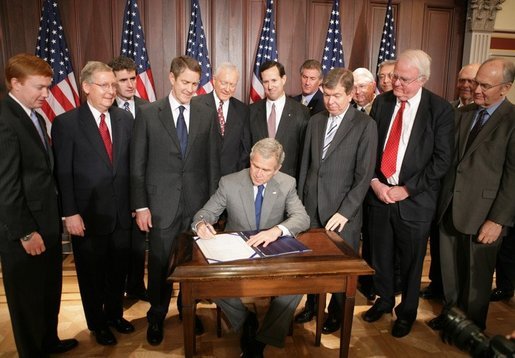
January 2008
In a move supported by both opponents and advocates of gun control laws, President Bush signs the National Instant Criminal Background Check Improvement Act requiring gun-buyer background checks to screen for legally declared mentally ill individuals who are ineligible to buy firearms.
June 26, 2008
In its landmark decision in the case of District of Columbia v. Heller, the U.S. Supreme Court ruled that the Second Amendment affirmed the rights of individuals to own firearms. The ruling also overturns a 32-year-old ban on the sale or possession of handguns in the District of Columbia.
February 2010
A federal law signed by President Barack Obama took effect allowing licensed gun owners to bring firearms into national parks and wildlife refuges as long as they are allowed by state law.
Dec. 9, 2013
The Undetectable Firearms Act of 1988, requiring that all guns must contain enough metal to be detectable by security screening machines was extended through 2035.
July 29, 2015
In an effort to close the “gun show loophole” allowing gun sales conducted without Brady Act background checks, U.S. Representative Jackie Speier introduces the Fix Gun Checks Act of 2015 to require background checks for all gun sales, including sales made over the internet and at gun shows.
June 12, 2016
President Obama again calls on Congress to enact or renew a law prohibiting the sale and possession of assault-style weapons and high-capacity ammunition magazines after a man identified as Omar Mateen kills 49 people in an Orlando, Florida, gay nightclub on June 12, using an AR-15 semiautomatic rifle. In a call to 9-1-1 he made during the attack, Mateen told police he had pledged his allegiance to the radical Islamic terrorist group ISIS.
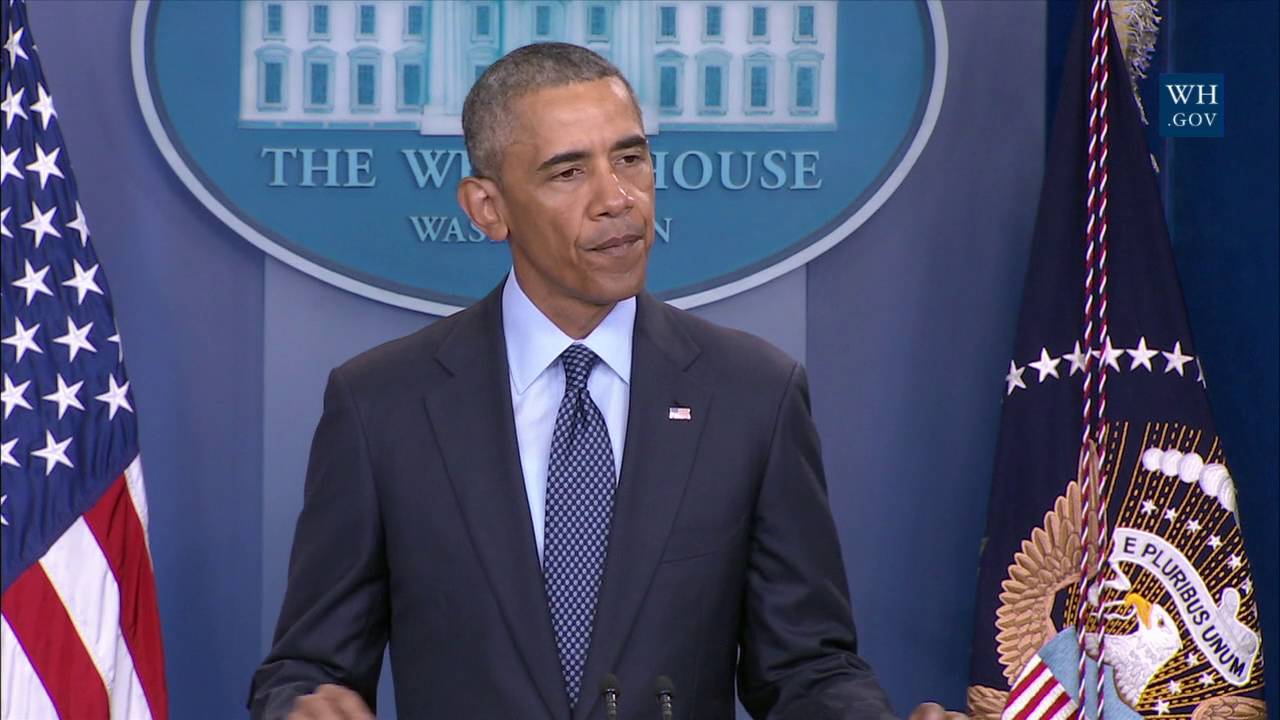
September 2017
A bill titled “Sportsmen Heritage and Recreational Enhancement Act,” or SHARE Act advances to the floor of the U.S. House of Representatives. While the main purpose of the bill is to expand access to public land for, hunting, fishing, and recreational shooting, a provision added by Representative Jeff Duncan called The Hearing Protection Act would reduce the current federal restrictions on purchasing firearm silencers or suppressors. Currently, the restrictions on silencer purchases are similar to those for machine guns, including extensive background checks, waiting periods, and transfer taxes. Duncan’s provision would eliminate those restrictions. Supporters of Duncan’s provision argue that it would help recreational hunters and shooters protect themselves from hearing loss. Opponents say it would make it harder for police and civilians to locate the source of gunfire, which would result in more casualties. Witnesses to the deadly mass shooting in Las Vegas on Oct. 1, 2017, reported that the gunfire coming from the 32nd floor of the Mandalay Resort sounded like “popping” that was at first mistaken as fireworks. Many argue that the inability to hear the gunshots made the shooting even more deadly.
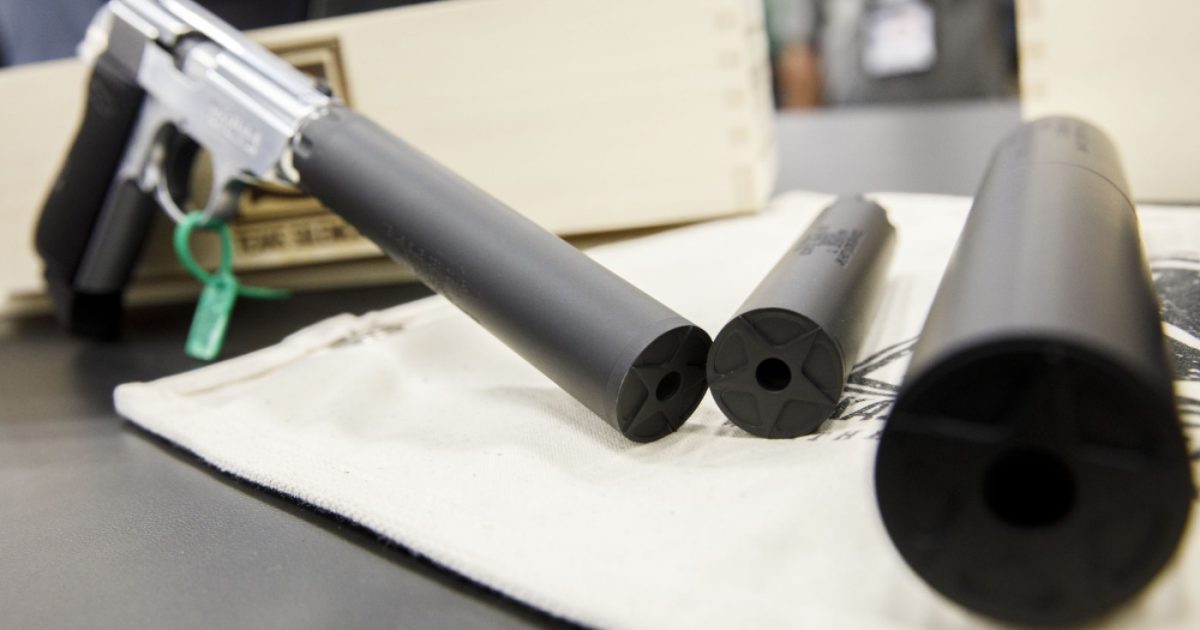
Oct. 1, 2017
Barely over a year after the Orlando shooting, a man identified as Stephen Craig Paddock opens fire on an outdoor music festival in Las Vegas. Shooting from the 32nd floor of the Mandalay Bay hotel, Paddock kills at least 59 people and wounds more than 500 others. Among the 23 firearms found in Paddock’s room were legally-purchased and semi-automatic AR-15 rifles had been fitted with commercially-available accessories known as “bump stocks". Under a law enacted in 2010, bump stocks are treated as legal after-market accessories. In the aftermath of the incident, lawmakers on both sides of the aisle have called for laws specifically banning bump stocks, while others have also called for a renewal of the assault weapons ban.
Oct. 4, 2017
Less than a week after the Las Vegas shooting, U.S. Senator Dianne Feinstein introduces the “Automatic Gunfire Prevention Act” that would ban the sale and possession of bump stocks and other devices that allow a semiautomatic weapon to fire like a fully-automatic weapon. The bill states: “It shall be unlawful for any person to import, sell, manufacture, transfer or possess, in or affecting interstate or foreign commerce, a trigger crank, a bump-fire device or any part, combination of parts, component, device, attachment or accessory that is designed or functions to accelerate the rate of fire of a semiautomatic rifle but not convert the semiautomatic rifle into a machine gun".
Oct. 5, 2017
Senator Feinstein introduces the Background Check Completion Act. Feinstein says the bill would close a loophole in the Brady Handgun Violence Prevention Act. Feinstein said that "Current law allows gun sales to proceed after 72 hours—even if background checks aren’t approved. This is a dangerous loophole that could allow criminals and those with mental illness to complete their purchase of firearms even though it would be unlawful for them to possess them". The Background Check Completion Act would require that a background check be fully completed before any gun buyer who purchases a gun from a federally-licensed firearms dealer can take possession of the gun.
Feb. 21, 2018
Just days after the February 14, 2018, mass shooting at Marjory Stoneman Douglas High School in Parkland, Florida, President Donald Trump orders the Justice Department and Bureau of Alcohol, Tobacco and Firearms to review "bump fire stocks". which are devices that allow a semi-automatic rifle to be fired similarly to a fully-automatic weapon. Trump had previously indicated that he might support a new federal regulation banning the sale of such devices. On February 20, Sanders stated that the president would support “steps” to raise the current minimum age for buying military-style weapons, such as the AR-15.
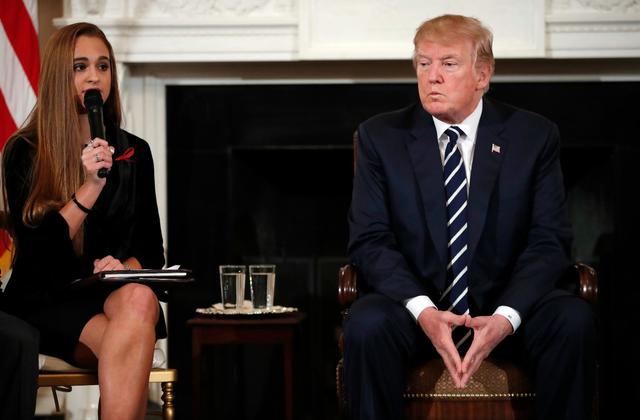
July 31, 2018
U.S. District Judge Robert Lasnik in Seattle issued a temporary restraining blocking the release of blueprints that could be used to produce untraceable and undetectable 3D-printable plastic guns. Assembled from ABS plastic parts, 3D guns are firearms that can be made with a computer-controlled 3D printer. The judge acted partly in response to a lawsuit filed against the federal government by several states to block the release of blueprints for 3D-printed plastic guns. Judge Lasnik’s order banned the Austin, Texas-based gun-rights group Defense Distributed from allowing the public to download the blueprints from its website. Before the restraining order, plans for assembling a variety of guns, including an AR-15-style rifle and a Beretta M9 handgun could be downloaded from the Defense Distributed website. Shortly after the restraining order was issued, President Donald Trump tweeted, “I am looking into 3-D Plastic Guns being sold to the public. Already spoke to NRA, doesn’t seem to make much sense!” The NRA said in a statement that "anti-gun politicians" and certain members of the press had wrongly claimed that 3D printing technology "will allow for the production and widespread proliferation of undetectable plastic firearms".
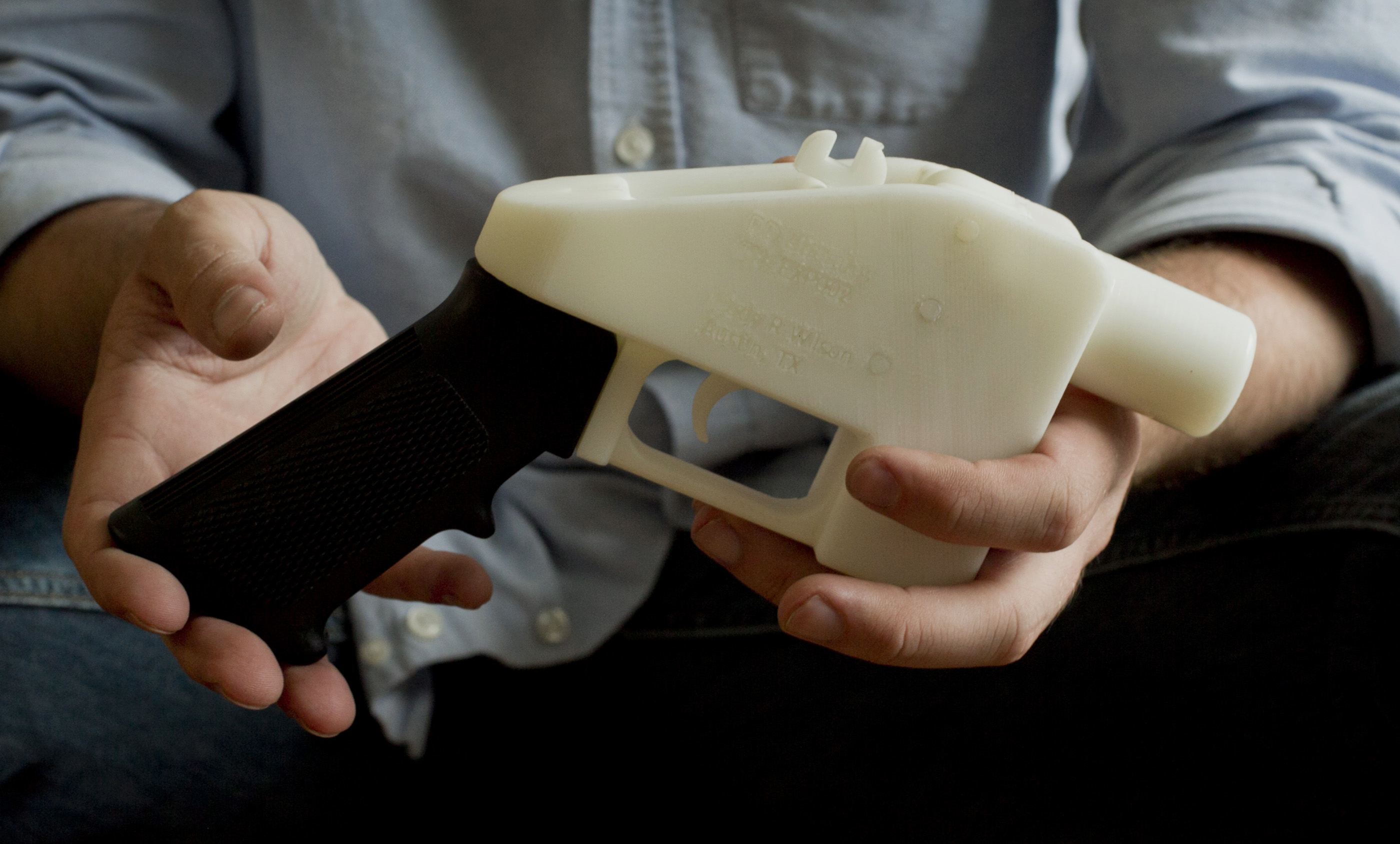
August 2019
In the wake of three mass shootings in Gilroy, California, El Paso, Texas, and Dayton, Ohio in the span of two weeks that left a total of almost three dozen people dead, a new push was made in Congress for gun control measures. Among the proposals were stronger background checks and limits on high-capacity magazines. "Red flag" laws also were proposed to allow police or family members to file a court petition to remove firearms from individuals who might pose a danger to themselves or others.
August 9, 2019
President Donald Trump indicated he would support new legislation requiring “common-sense” background checks for gun purchases. Noting that he had spoken to National Rifle Association CEO Wayne LaPierre, the president said the issue “isn't a question of NRA, Republican or Democrat. We will see where the NRA will be, but we need meaningful background checks". The House of Representatives had previously passed the Bipartisan Background Checks Act of 2019, which would ban most person-to-person firearm transfers without a background check, including firearm transfers at gun shows and between individuals. The bill passed 240-190, with eight Republicans joining almost all Democrats in voting for the bill. As of September 1, 2019, the Senate had taken no action on the bill.
August 12, 2019
President Trump voiced his support for red flag gun confiscation laws. “We must make sure that those judged to pose a grave risk to public safety do not have access to firearms and that if they do, those firearms can be taken through rapid due process," he said in televised remarks from the White House. “That is why I have called for red flag laws, also known as extreme risk protection orders.”
August 20, 2019
After speaking with NRA Chief Executive Wayne LaPierre, President Trump seemed to back away from supporting expanded background checks for firearm purchases. “We have very strong background checks right now,” he said, speaking from the Oval Office. “And I have to tell you that it is a mental problem. And I've said it a hundred times it's not the gun that pulls the trigger, it's the people.” Trump also stressed his support for the Second Amendment, stating that he would not want to go down the “slippery slope” of infringing on the right to bear arms.
January 20, 2020
Representative Hank Johnson, a Georgia Democrat who sits on the House Judiciary Committee, introduced H.R. 5717, which would, among other items, ban the purchasing and possession of assault weapons. Senator Elizabeth Warren introduced in February the Senate version of the bill, S.3254. The legislation introduced a variety of reforms with the intent to "end the epidemic of gun violence and build safer communities by strengthening Federal firearms laws and supporting gun violence research, intervention, and prevention initiatives". The bill addresses background checks, taxes on firearms and goods related to firearms, gun storage, accessibility of guns on school campuses, and more.